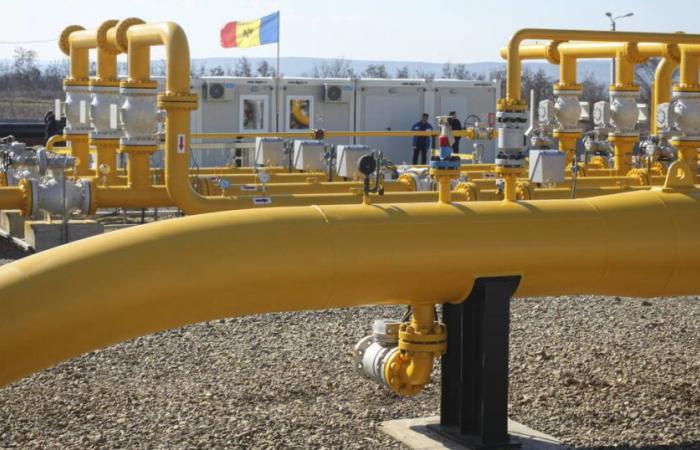The levers of Russian influence in Moldova take multiple forms. Some are intangible, like the propaganda that spreads like poison on social networks. Others are visible to the naked eye, they have a length and a circumference, like the branch of the Soyuz gas pipeline which connects the country to Russia. For a long time, this pipe which crosses Ukraine was the main instrument of energy blackmail practiced by Moscow against the country. In December 2022, when Moldova painfully weaned itself off its near-total dependence on Russian gas, it appeared to become inoperable. Paradoxically, it is its shutdown, scheduled for January 1, 2025 when the transit contract through Ukraine ends, which has restored the power of nuisance to Moscow.
Although the Moldovan government has no longer purchased gas from Russia over the past 24 months, the Russian company Gazprom has continued to supply the separatist enclave of Transnistria free of charge via this pipeline, as it has done ever since. over thirty years. The eventual end of this supply would pose an existential problem for the de facto authorities in Tiraspol. The entire economy of the region and the revenues of the authorities are based on access to very cheap energy which powers heavy industry inherited from the Soviet period. Without almost free Russian gas, the whole model risks collapsing.
Risks of blackout
From Chisinau's point of view, this could appear as good news, likely to create a potential opening towards the reintegration of these territories. But if Transnistria and its 350,000 inhabitants no longer have access to Russian gas, the entire country risks suffering a difficult winter. Moldova's main power plant, which supplies around 50% of national consumption, is located in Cuciurgan, in separatist territory. It is gas from Moscow that supplies it.
In the event of a cessation of deliveries of Russian hydrocarbons, a hypothesis considered “very likely” by the Moldovan government, Chisinau warned that the country risks facing blackouts. Since the massive bombing of Ukraine's electricity infrastructure, which provided 75% of its needs until 2023, Moldova no longer has many potential suppliers. It can only turn towards Romania. But this supply is not without risks either: apart from the fact that Romanian electricity costs twice as much as that sold by Transnistria, the high voltage connection between the two countries passes through Ukraine. In the event of a Russian attack on infrastructure, which is common at the start of winter, the network can quickly become unstable. A direct high-voltage line with Romania is under construction, but it will not be completed for at least a year.
If Transnistria runs out of gas on January 1, “it will not just be a crisis, but a humanitarian catastrophe”warned Oleg Serebrian, minister responsible for the reintegration of separatist territories. On the Transnistrian side, heating in the city risks quickly stopping, while temperatures are already negative in the region. Electricity production could last a little longer: according to Tiraspol, the Cuciurgan power plant could idle thanks to coal reserves for around fifty days.
Alternative supply route
However, this scenario is not inevitable. Gazprom could continue to deliver its fuel to the separatists via another network of pipes passing through Turkey. But the Russian company has for the moment refrained from reserving transit volumes on these gas pipelines. Moscow has indicated that this solution could only be considered if Chisinau pays a debt of more than 700 million dollars that Gazprom conveniently took out of its drawers upon the arrival of the pro-European government in 2021. For the Kremlin, this is a clever way of putting pressure on Moldova, by accusing it of doing nothing to protect the Russian speakers of Transnistria.
«[La Russie] sends these people into a crisis created from scratch to destabilize our country”denounced the Prime Minister, Dorin Recean. If Gazprom deliveries stop, Chisinau plans to supply gas to Transnistria. But in this situation, who would pay for the fuel? “We are working with the Transdniestrian side so that they understand that sooner or later they will have to pay the market price for gas”indicated the Minister of Energy at the beginning of the month. But it seems unlikely that Tiraspol will willingly comply with this constraint which would bring its economic model to its knees.
The pro-Russians ready to exploit the crisis
According to the Moldovan government, supplying gas to Transnistria would represent an annual cost of $400 million. A significant weight for the poorest country in Europe, which has already struggled to fill its gas reserves for the winter. Moldovagaz, which still has Gazprom as its majority shareholder, strangely did not take advantage of the lower summer prices to buy sufficient volumes for the cold months. The whole country learned this with surprise and bitterness when the price of gas for households increased by almost 30% in November. Questioned by Parliament about its inaction, Vadim Ceban, the company's boss, suggested buying gas in Moscow before the end of transit through Ukraine. He has since been disembarked.
This combination of pressures on energy creates a storm that is difficult for the pro-European government to manage. Conversely, it offers a ready-made argument to the pro-Russian parties: if relations with Moscow were better, gas and electricity would be cheaper and life simpler, they argue. A few months before crucial legislative elections scheduled for June, this speech could carry. In 2022, the brutal rise in gas prices, when Gazprom stopped supplying the country, had already provided a perfect argument for pro-Russian networks to orchestrate major demonstrations.
“The Kremlin wants to burden our budget with costs linked to electricity and the humanitarian crisis [en Transnistrie]. His lackeys in Chisinau will then be able to exploit poverty and the economic crisis for the elections”warned the Prime Minister. A cynical plan that has a good chance of working if crises pile up over the winter.






